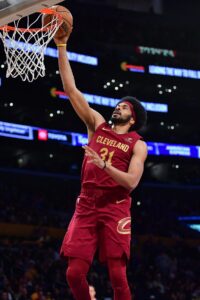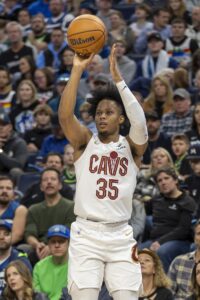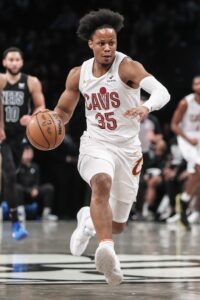Rosters for the 2024/25 season are far from being set, but it’s never too early to try to predict some of next season’s happenings. When considering players who are primed for breakouts, draft picks who immediately became stars like Paolo Banchero and Victor Wembanyama come to mind, but several more players in a tier below that will emerge as rotation mainstays for the first time.
Think players like Sam Hauser of the Celtics. Hauser gradually crept up Boston’s rotation over the past three years, eventually becoming a part of the title core and earning himself an extension. Likewise, Miles McBride was a second-round pick who showed promise, but eventually broke out after the ’23/24 deadline for New York. Isaiah Joe of the Thunder is another example, while Vince Williams of the Grizzlies and Simone Fontecchio of the Pistons also broke onto the scene earlier this year.
With that said, here are four players I think could “break out” next season in the sense that they go from a fringe rotation piece to a reliable regular for a team.
This might be cheating a bit, since Sharpe appeared in 61 games last season and averaged 6.8 points and 6.4 rebounds. However, he managed to record those numbers in just 15.1 minutes per night, improving across the board for the Nets. I expect Sharpe to play more this season even though he’s still behind Nic Claxton in the rotation.
For starters, the Nets pivoted toward a rebuild this offseason after trading away Mikal Bridges. With Bridges gone and players like Cameron Johnson, Dorian Finney-Smith, Bojan Bogdanovic and Dennis Schröder set up to be potential trade pieces, there should be more minutes to go around at some point in the season, at least in theory. That would put Sharpe, the No. 29 overall pick in 2021, in prime position to play more and continue to show off his improvement.
Sharpe is set to be a restricted free agent next offseason and, if he manages to continue to show linear growth, I wouldn’t be surprised to see him draw a bevy of suitors. If the Nets didn’t want to pay Sharpe after handing a contract to Claxton this offseason, Sharpe could draw interest at the deadline for a playoff team needing size or another young team looking for a mainstay.
Given his contract status, youth (heturns 23 this season), and team positioning, Sharpe seems like a solid candidate to “break out” for next season.
The Lakers have had a quiet offseason, with their only external additions being 2024 draftees Dalton Knecht and Bronny James. One move that flew under the radar was the long-term extension of Christie, a player who only played 14.1 minutes last season. While the 2022 No. 35 pick saw his responsibilities increase last season from his rookie year, he holds a career average of 3.8 points per game.
Clearly, the Lakers liked what they saw from the 21-year-old Christie, as they rewarded him with a $32MM deal. While he hasn’t played a ton at the NBA level, he holds solid upside as a three-and-D prospect. It was somewhat surprising, for my money, that a team with cap space didn’t try to price Christie out of the Lakers’ range.
The Lakers getting Christie back could be a huge win for a team that needs three-and-D players in their rotation. Given that the Lakers might still make a trade before the year and players ahead of him last year either fell out of favor or simply left in free agency, Christie seems like a lock for more minutes and production next season. He could have a key role for the Lakers in the final couple years of his contract if things play right.
While Porter and Council are distinctly different players, both could improve and continue to work their way into the rotations of playoff contenders in the Eastern Conference, which is why they’re grouped together here.
Porter played more on a two-way contract last season before being promoted to a standard deal. He’s a small guard but has played well above his size both in college and in the pros. He works well as a secondary ball-handler and a solid defensive guard. While the Cavaliers still have three open roster spots and could add a player or two who may overtake Porter in the guard room, I could see him winning the ninth or 10th spot in the rotation and potentially being the club’s top backup lead guard.
Council didn’t play as much for the Sixers until the end of the season, but his high efficiency impressed the organization and they rewarded him with a standard contract.
While Philadelphia eventually re-signed Tyrese Maxey, Kelly Oubre, Kyle Lowry and KJ Martin, I find it telling that the Council was just one of two players from last year’s roster who stayed on the roster throughout the entire offseason. His contract for next season is non-guaranteed, so they easily could have waived him if they felt someone else better fit his role. Martin and draft picks Jared McCain and Adem Bona might not play much next season, which has Council and Eric Gordon looking like the team’s only true bench wings off the bench.
While it’s not a lock Porter or Council make an impact on the rotation this year — let alone make it through their contracts being guaranteed at the league-wide date in 2025 — their organizations have shown they value each respective player. To me, Porter and Council are some of the more likely candidates to follow Hauser’s footsteps of developing for a couple seasons before breaking into a rotation.
 “We couldn’t be more excited that Jarrett Allen chose to extend in Cleveland for the prime of his career,” president of basketball operations Koby Altman said. “Jarrett’s growth as a player, at just 26 years old, was accelerated when he earned his first All-Star selection in 2022. He is the anchor of our core group of players and his presence fits our vision for sustainable success. Jarrett also embodies the culture and values of our organization, and we look forward to achieving even greater things together.”
“We couldn’t be more excited that Jarrett Allen chose to extend in Cleveland for the prime of his career,” president of basketball operations Koby Altman said. “Jarrett’s growth as a player, at just 26 years old, was accelerated when he earned his first All-Star selection in 2022. He is the anchor of our core group of players and his presence fits our vision for sustainable success. Jarrett also embodies the culture and values of our organization, and we look forward to achieving even greater things together.” There are still a couple teams with cap room available, so one of those teams – the Pistons and Jazz – could make life difficult for the Cavaliers by giving Okoro an offer sheet in that $12-15MM range, but there has been no indication either club plans to do so. A sign-and-trade to an over-the-cap team is another possibility, and Fedor confirmed in
There are still a couple teams with cap room available, so one of those teams – the Pistons and Jazz – could make life difficult for the Cavaliers by giving Okoro an offer sheet in that $12-15MM range, but there has been no indication either club plans to do so. A sign-and-trade to an over-the-cap team is another possibility, and Fedor confirmed in  “The sense that I get in talking to a lot of people around the NBA, I’m not sure what the offer is specifically that the Cavs have made to Isaac, (but) they believe that it’s a fair offer. It’s a multiyear offer,” Fedor said (hat tip to
“The sense that I get in talking to a lot of people around the NBA, I’m not sure what the offer is specifically that the Cavs have made to Isaac, (but) they believe that it’s a fair offer. It’s a multiyear offer,” Fedor said (hat tip to